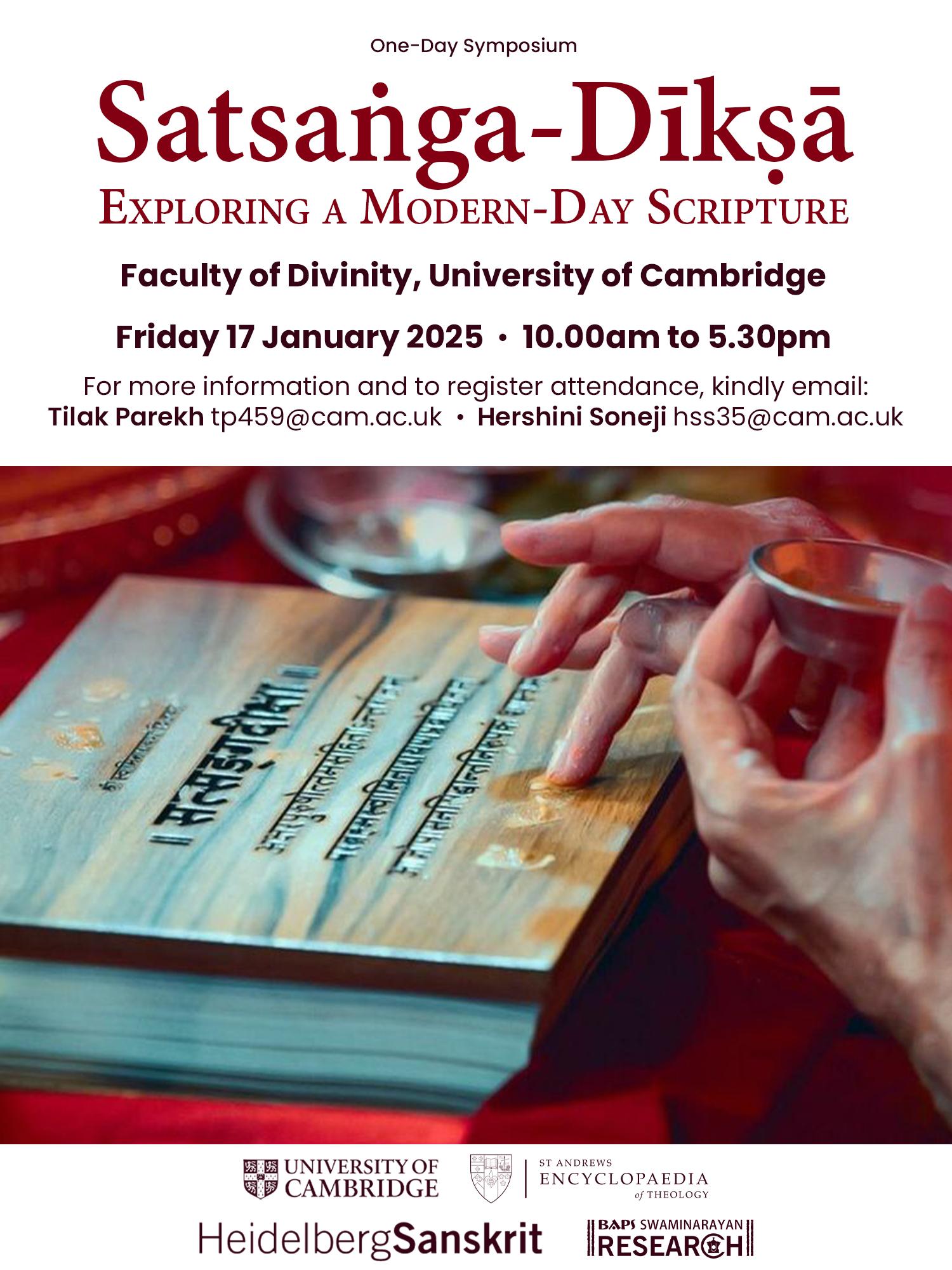
Date: Friday 17 January 2025
Time: 10.00am to 5.30pm
Venue: Faculty of Divinity, University of Cambridge
The Satsaṅga-Dīkṣā is a vital scripture of the BAPS Swaminarayan tradition, one of the largest, fastest-growing, and most prominent Hindu groups in the world today. Since the text’s composition in 2020, it has become an integral part of the daily worship, study, and formative life of thousands of BAPS followers in India and across the diaspora. Because of its concise, didactic form (expressed in the form of exhortations and commandments in Sanskrit and Gujarati), succinct philosophical exposition, and detailed enumeration of principles of practical morality and devotional practice, it now serves as an important foundation of the Swaminarayan tradition’s distinctive system of Vedānta (Akṣara-Puruṣottama-Darśana) and spiritual way of life. In its 315 verses, it covers a wide variety of traditional topics such as dharma, bhakti, mukti, tyāga, yoga, dīkṣā, mandīra, mūrti, etc. as well as a number of contemporary subjects such as civil law, domestic life, and finance.
The significance of the Satsaṅga-Dīkṣā among the BAPS Swaminarayan Hindu community primarily stems from its authorial source; it was originally written by the current guru of the fellowship, Mahant Swami Maharaj. For the followers, this makes the text immediately revelatory, auspiciously sacred, and concretely implementable in their everyday lives.
One of the many intriguing features of this relatively new Sanskrit–Gujarati hybrid text is its rapid acquisition of transnational popularity. Over a million copies of this text, in the form of a small booklet, have been printed so far. It has been translated into five major vernacular languages of India, many European languages, Swahili, Nepali, and two versions of Braille. A study app for mobile devices has also been developed, which has been downloaded approximately 200,000 times. Furthermore, over the last four years, the text has become a focal point of study, recitation, and memorisation by BAPS followers. National study programmes and competitions have been held across India, the UK, the US, Canada, Australia, New Zealand, Kenya, South Africa, the UAE, and other countries. Thousands, ranging from young children to the elderly, are studiously memorising its 315 Sanskrit and Gujarati verses. In an annual international online study course, over 20,000 individuals are currently receiving weekly videos and resources for a deeper conceptual understanding and practical application of the text. For a text so recent, this extensive range of public engagement—as indicated by the data relating to worldwide numbers, variety of methods, and depth of study—makes it especially worthy of academic study.
This symposium thus seeks to facilitate research and dialogue in a number of disciplinary areas directly related to the text. In doing so, the symposium will provide a forum for the exploration of the vitality and relevance of contemporary Sanskrit scripture and will be a significant opportunity to engage with some articulations of lived Hinduism.
For more information and to register attendance, kindly email Tilak Parekh tp459@cam.ac.uk or Hershini Soneji hss35@cam.ac.uk.
Please click here for the programme.
Convenors
- Tilak Parekh (PhD Candidate, Faculty of Divinity, University of Cambridge)
- Hershini Soneji (PhD Candidate, Faculty of Asian and Middle Eastern Studies, University of Cambridge)
- Kush Depala (PhD Candidate, South Asia Institute, University of Heidelberg)
Academic Advisors
- Prof. James Hegarty (Professor of Sanskrit and Indian Religions, Cardiff University)
- Dr Avni Chag (Assistant Professor of Hindu Studies, Vrije Universiteit Amsterdam)
- Dr Ankur Barua (University Senior Lecturer in Hindu Studies, Faculty of Divinity, University of Cambridge)
- Dr Sadhu Paramtattvadas (BAPS Swaminarayan Research Institute, London)

